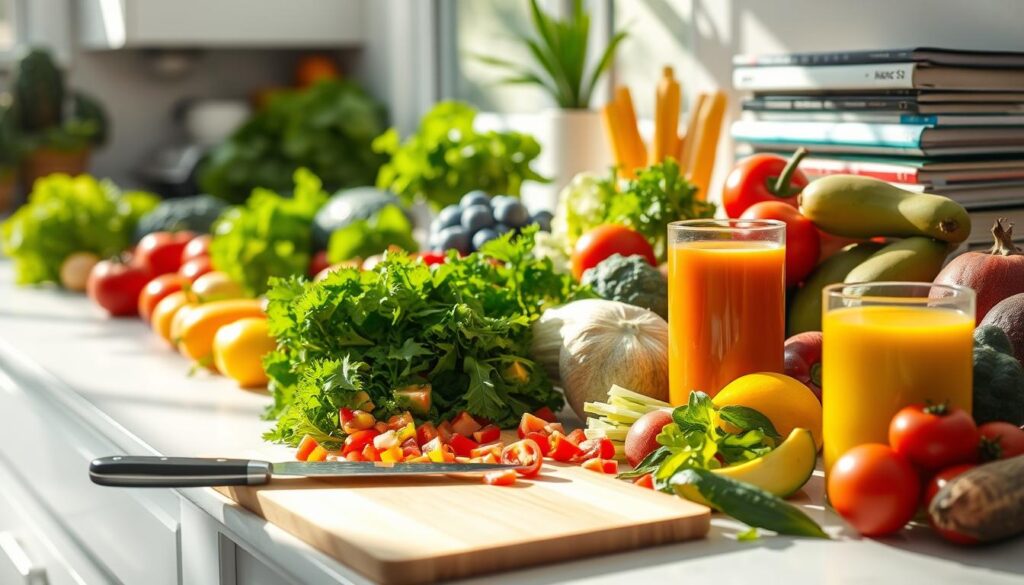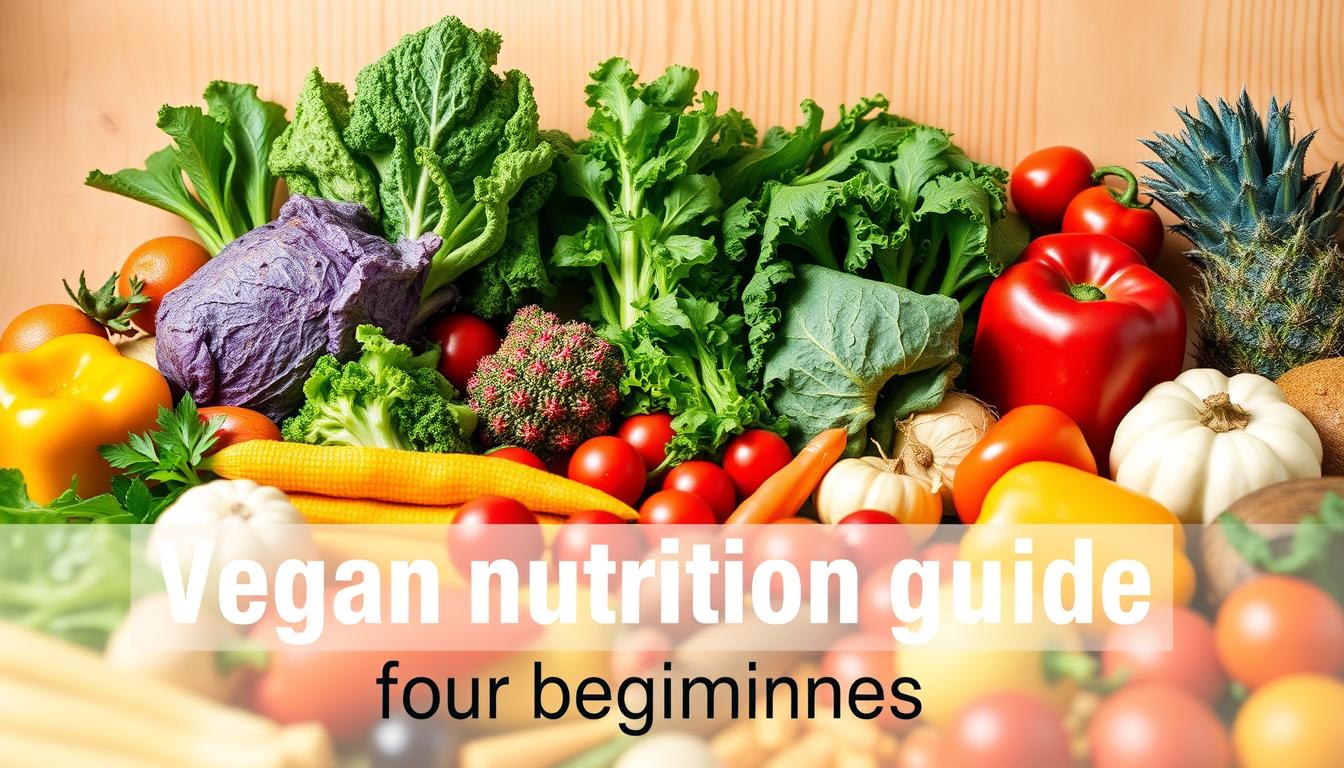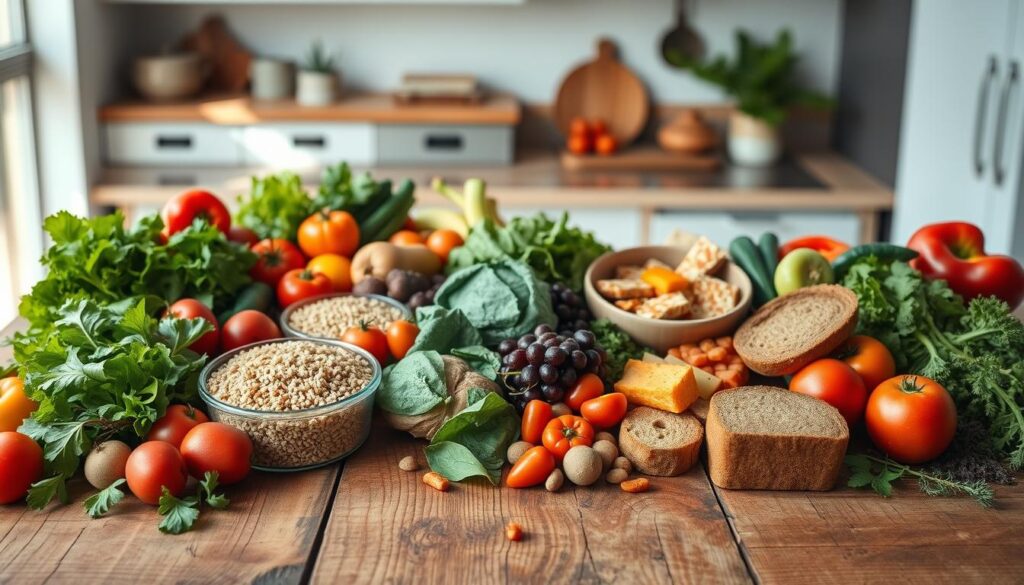Are you curious about adopting a plant-based lifestyle but unsure where to start? Embracing a vegan diet can be a transformative journey towards a healthier you and a more sustainable planet.
As a beginner, navigating the world of vegan nutrition can seem daunting, but with the right guidance, it can be a rewarding experience. This guide is designed to provide you with a comprehensive overview of vegan nutrition, covering the essentials of a balanced diet and debunking common myths.
By the end of this guide, you’ll be equipped with the knowledge to make informed choices about your diet and lifestyle. Let’s embark on this journey together and explore the benefits of a well-planned vegan diet.
Key Takeaways
Table of Contents
- Understanding the basics of vegan nutrition
- Identifying key food groups for a balanced vegan diet
- Debunking common myths about veganism
- Tips for transitioning to a vegan lifestyle
- Benefits of a well-planned vegan diet
Understanding the Basics of Veganism
Understanding veganism starts with its core dietary practices. A vegan diet excludes all animal products, including meat, dairy, eggs, and even honey. It’s not just about food; it’s a lifestyle choice that seeks to minimize harm to animals and the environment.
What Defines a Vegan Diet
A vegan diet is rich in fruits, vegetables, whole grains, and legumes. It’s characterized by the absence of animal-derived foods, making it a plant-based diet by default. Vegans also avoid using products made from animals, like leather and fur, and products tested on animals.
Health Benefits of Plant-Based Eating
Plant-based eating has been associated with numerous health benefits, including lower risks of heart disease, diabetes, and certain cancers. A well-planned vegan diet can provide all the necessary nutrients for good health, making it a viable choice for people of all ages.
Common Misconceptions About Vegan Nutrition
One common misconception is that vegan diets are protein-deficient. However, with a little planning, it’s easy to meet protein needs through plant-based sources like beans, lentils, and tofu. Another misconception is that vegan diets are boring, but with a bit of creativity, they can be quite the opposite.
| Nutrient | Plant-Based Sources | Benefits |
|---|---|---|
| Protein | Beans, Lentils, Tofu | Builds and repairs muscles |
| Iron | Spinach, Beans, Fortified cereals | Essential for healthy red blood cells |
| Calcium | Fortified plant milk, Kale, Broccoli | Crucial for bone health |
Essential Nutrients for a Balanced Vegan Diet
A balanced vegan diet necessitates a thorough understanding of the nutrients that are crucial for optimal health. Vegans must be particularly mindful of their intake of certain nutrients that are commonly found in lower levels in plant-based foods.
Plant-Based Protein Sources
Protein is a vital nutrient that can be easily obtained from various plant-based sources. Some of the richest sources include:
- Legumes (lentils, chickpeas, black beans)
- Nuts and seeds (almonds, chia seeds, hemp seeds)
- Whole grains (quinoa, brown rice, whole wheat)
- Tofu and tempeh
Ensuring a variety of these foods in your diet can help meet your protein needs.
Getting Enough Iron and Calcium
Iron and calcium are crucial for healthy red blood cells and bone health, respectively. Iron-rich foods include lentils, spinach, and fortified cereals, while calcium-rich foods include fortified plant milk, kale, and broccoli.
Vitamin B12, D, and Omega-3 Considerations
These nutrients are often highlighted as areas of concern for vegans. Vitamin B12 is crucial for nerve function and red blood cell formation, and is primarily found in animal products, making supplements or fortified foods essential.
Supplement Recommendations
Consider consulting a healthcare professional about taking supplements for Vitamin B12, D, and Omega-3, as they can help fill any nutritional gaps.
Food Sources for Key Nutrients
For Omega-3, look to algae oil supplements or walnuts and chia seeds. Vitamin D can be obtained through sunlight exposure, fortified foods, or supplements.
Vegan Nutrition Guide for Beginners: Creating Your Meal Plan
Starting your vegan journey can be made easier with a comprehensive meal plan. A well-structured meal plan ensures you’re getting all the necessary nutrients while enjoying a variety of delicious vegan recipes.
The Balanced Vegan Plate Formula
A balanced vegan plate should consist of a variety of food groups. Aim to fill your plate with 50% vegetables, including leafy greens and colorful vegetables, 25% protein sources like legumes, tofu, or tempeh, and 25% whole grains or starchy vegetables.
For example, a balanced meal could include a quinoa salad with roasted vegetables, chickpeas, and a citrus vinaigrette dressing.
Sample 7-Day Meal Plan for New Vegans
Here’s a simple 7-day meal plan to get you started:
- Monday: Oatmeal with almond milk, banana, and walnuts
- Tuesday: Lentil soup with whole-grain bread
- Wednesday: Grilled tofu with roasted vegetables and quinoa
- Thursday: Chickpea salad with mixed greens and whole-grain crackers
- Friday: Vegan stir-fry with tempeh, mixed vegetables, and brown rice
- Saturday: Smoothie bowl with banana, spinach, almond milk, and chia seeds
- Sunday: Black bean tacos with avocado salsa and brown rice
Adjusting Portions for Your Nutritional Needs
Adjusting your meal portions based on your nutritional needs is crucial. Factors such as age, gender, activity level, and health goals will influence your calorie and nutrient requirements.
Calorie Considerations
Caloric needs vary widely among individuals. For instance, an active person may require more calories than someone who is sedentary. Use an online calorie calculator to determine your daily needs.
Macro and Micronutrient Balance
Ensuring a balance of macro and micronutrients is vital. Macros include carbohydrates, proteins, and fats, while micronutrients encompass vitamins and minerals. A varied diet that includes a range of whole foods can help achieve this balance.
Effective meal planning is key to a successful vegan lifestyle. By understanding the balanced vegan plate formula, following a sample meal plan, and adjusting portions according to your needs, you can enjoy a nutritious and satisfying vegan diet.
Smart Grocery Shopping for New Vegans
Grocery shopping is a crucial step in maintaining a vegan lifestyle, and knowing what to buy makes all the difference. As you transition to a vegan diet, having the right pantry staples and understanding how to navigate food labels can simplify your shopping experience.
Essential Pantry Staples Checklist
Stocking your pantry with the right staples is the first step towards successful vegan grocery shopping. Here are some essentials to get you started:
- Whole grains like quinoa, brown rice, and whole wheat pasta
- Canned beans, lentils, and tomatoes
- Nuts and seeds, including almonds, chia seeds, and flaxseeds
- Dried fruits and vegetables
- Vegan-friendly condiments and spices
Navigating Food Labels and Ingredients
Understanding food labels is crucial for vegan shoppers. Look for certifications like Vegan Society or Certified Vegan to ensure the product is free from animal-derived ingredients. Be aware of hidden animal products like gelatin, honey, and certain food colorings.
Budget-Friendly Vegan Shopping Strategies
Eating vegan doesn’t have to break the bank. Here are some budget-friendly tips:
Seasonal and Bulk Buying Tips
Buying seasonal produce and purchasing items like grains, nuts, and dried fruits in bulk can significantly reduce your grocery bill.
Plant-Based Alternatives Worth the Investment
While some vegan alternatives may seem pricey, they are often worth the investment due to their nutritional value and versatility in cooking.
| Product | Average Price | Bulk Price |
|---|---|---|
| Quinoa (1 lb) | $2.50 | $1.80/lb (5 lbs) |
| Almonds (1 lb) | $10 | $7/lb (5 lbs) |
| Canned Black Beans (1 can) | $1.20 | $0.80/can (12 cans) |

By implementing these strategies, new vegans can make grocery shopping a straightforward and manageable task, setting them up for success on their vegan journey.
Quick and Nutritious Vegan Recipes
Vegan recipes can be quick, easy, and incredibly satisfying, making them perfect for busy days. Whether you’re new to veganism or looking to refresh your meal routine, these recipes will guide you through delicious and healthy eating.
5-Minute Breakfast Ideas
Starting your day with a nutritious breakfast is easier than you think. Try a banana oatmeal bowl with almond milk, or a vegan smoothie packed with spinach, banana, and chia seeds.
Protein-Packed Lunch Options
For a satisfying lunch, consider a quinoa salad with roasted vegetables and a citrus vinaigrette, or a vegan wrap filled with hummus, avocado, and mixed greens.
Simple Dinner Recipes for Beginners
Dinner can be straightforward with one-pot meals like a hearty lentil stew or a flavorful vegan curry. These dishes are not only easy to prepare but also rich in nutrients.
One-Pot Meals for Busy Days
One-pot meals are a lifesaver on busy days. They require minimal cleanup and can be ready in under 30 minutes. Try a vegan chili with a variety of beans and vegetables.
Batch Cooking for Weekly Success
Batch cooking is a great strategy for ensuring you have healthy meals throughout the week. Prepare a large batch of vegan rice bowls with different toppings for a quick and easy meal any day of the week.
By incorporating these quick and nutritious vegan recipes into your meal routine, you’ll be well on your way to a healthier, more sustainable eating habit.
Overcoming Common Challenges When Transitioning
Embracing a vegan lifestyle is a significant change, and overcoming the initial hurdles is crucial for long-term success. As you transition to a plant-based diet, you may encounter several challenges, but being aware of them can help you navigate this journey more effectively.
Managing Cravings and Satisfaction
One of the common challenges is managing cravings for your favorite non-vegan foods. To overcome this, focus on incorporating a variety of plant-based protein sources and satisfying meals into your diet. Some tips include:
- Eating regular, balanced meals to keep your hunger in check
- Incorporating vegan versions of your favorite comfort foods
- Exploring new recipes and flavors to keep your meals exciting
Navigating Social Situations and Dining Out
Social gatherings and dining out can be challenging when you’re vegan. However, with some preparation, you can enjoy these experiences without compromising your dietary choices. Consider:
- Researching vegan-friendly restaurants before heading out
- Informing your hosts about your dietary preferences when attending social gatherings
- Carrying vegan snacks to avoid feeling left out
As veganism becomes more mainstream, you’ll find that many restaurants are now catering to plant-based diets, making it easier to dine out.
Addressing Nutritional Concerns from Family and Friends
Family and friends may express concerns about your nutritional well-being when you adopt a vegan diet. Being prepared to address these concerns can help alleviate their worries and support your decision.
Tracking Your Nutritional Progress
Keeping track of your nutritional intake can help ensure you’re meeting your dietary needs. Consider using a food diary or a nutrition app to monitor your progress.
When to Consult a Nutrition Professional
If you’re feeling uncertain about your nutritional needs or have specific health concerns, consulting a registered dietitian or a nutrition professional can provide personalized guidance and reassurance.

By being aware of these common challenges and having strategies to overcome them, you can successfully transition to a vegan lifestyle and enjoy its many benefits.
Conclusion: Your Journey to a Healthy Vegan Lifestyle
Embarking on a vegan lifestyle can be a rewarding and healthy choice when done correctly. This vegan nutrition guide for beginners has provided you with the essential knowledge to make informed decisions about your diet.
By understanding the basics of veganism, incorporating essential nutrients, and planning your meals, you can enjoy the numerous health benefits associated with a plant-based diet. A well-planned vegan diet can provide all the necessary nutrients for optimal health, making it a great choice for those looking to adopt a healthier lifestyle.
As you continue on your journey, remember that a beginner’s guide to veganism is just the starting point. Experiment with new recipes, explore different cuisines, and connect with like-minded individuals to make your transition to a vegan lifestyle smooth and enjoyable.
With the right mindset and knowledge, you can thrive on a vegan diet and enjoy the many benefits it has to offer. Start your journey today and discover a healthier, more compassionate you.
FAQ
What is a vegan nutrition guide for beginners, and why is it important?
A vegan nutrition guide for beginners is a resource that provides essential information on adopting a plant-based diet. It’s crucial for ensuring that new vegans understand how to maintain a balanced and healthy diet, avoiding nutritional deficiencies.
How do I get enough protein on a vegan diet?
You can get enough protein on a vegan diet by consuming a variety of plant-based protein sources, such as legumes, beans, lentils, tofu, tempeh, and seitan. Incorporating these foods into your meals can help meet your daily protein needs.
What are some common misconceptions about vegan nutrition?
Common misconceptions about vegan nutrition include the idea that a vegan diet is inherently lacking in essential nutrients or that it’s too restrictive. In reality, a well-planned vegan diet can provide all the necessary nutrients for optimal health.
How do I create a balanced vegan meal plan?
To create a balanced vegan meal plan, focus on incorporating a variety of whole, minimally processed foods, including fruits, vegetables, whole grains, legumes, nuts, and seeds. Using the balanced vegan plate formula can also help guide your meal planning.
What are some tips for smart grocery shopping on a vegan diet?
Smart grocery shopping on a vegan diet involves stocking up on essential pantry staples, navigating food labels to avoid animal-derived ingredients, and adopting budget-friendly strategies like seasonal and bulk buying.
How can I ensure I’m getting enough Vitamin B12 on a vegan diet?
To ensure you’re getting enough Vitamin B12 on a vegan diet, consider taking a Vitamin B12 supplement or consuming fortified foods, such as plant-based milk, cereals, and meat substitutes.
What are some quick and nutritious vegan recipes for beginners?
Quick and nutritious vegan recipes for beginners include simple breakfast ideas like overnight oats, protein-packed lunch options like lentil soup, and easy dinner recipes like one-pot pasta dishes.
How can I manage cravings and stay satisfied on a vegan diet?
Managing cravings and staying satisfied on a vegan diet involves incorporating a variety of whole, minimally processed foods, staying hydrated, and being mindful of your nutritional needs.
What are some tips for navigating social situations on a vegan diet?
Navigating social situations on a vegan diet involves being prepared, communicating your dietary needs to others, and having a plan for eating out or attending social gatherings.

